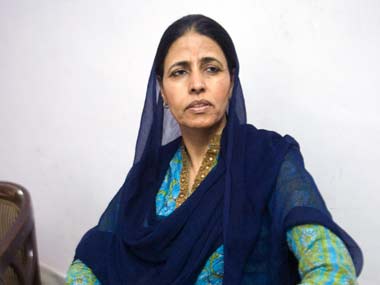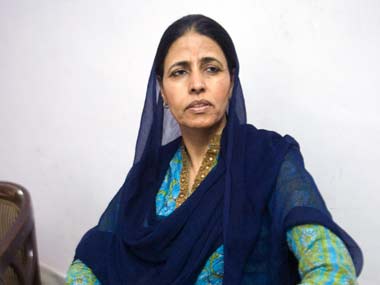We expect the wife of a death row convict to be a prisoner of the past, for whom, the future holds no relevance. She may cry every time her husband is mentioned before her, remembering the goodness of her man and the days they spent together. Ignorant of the nuances of criminal jurisprudence, she may insist on her husband’s release. Navneet Kaur, wife of death row convict, Devinder Pal Singh Bhullar, is not such a woman. Her body language is that of a surgeon who discusses matters of life and death with detachment. “How much sugar?” are her first words as we settle down in a room in Gurudwara Bangla Sahab in New Delhi. While serving tea, her searching gaze assesses the understanding you have of the case, measuring the usefulness of discussing her case history with you. [caption id=“attachment_780755” align=“alignleft” width=“380”]  Naresh Sharma/Firstpost[/caption] In August 2001, a trial court in Delhi sentenced awarded capital punishment to Bhullar under the Terrorist & Disruptive Activities Act (Tada). He is the key accused in the 1993 bomb blast case outside the Indian Youth Congress office in Delhi in which nine people were killed. Since then, Kaur has met politicians, religious leaders, journalists, human right activists and lawyers, in a push to convert the death sentence into life imprisonment. Kaur, on her part, maintains that her family and that of Bhullar, were themselves victims of insurgency. More than 40 college students had gone missing in Punjab. When Bhullar spoke for them, police fabricated him in the bomb blast case, says Kaur. “That was a very bad time. Police tortured my father. They beat him mercilessly. My father-in-law got disappeared,” she says, adding that so far, police have not recovered any piece of evidence to prove its claim of Bhullar being a Khalistani terrorist. The mercy petition filed in 2003 was rejected by former president Pratibha Patil in May 2011. Kaur moved the Supreme Court (SC) seeking that Bhullar’s death penalty should be commuted to life as there was an inordinate delay by the President’s office in deciding his petition. But in April this year, the SC rejected the plea, ruling that delay cannot be a ground for mercy in terrorism cases. She filed a review plea challenging the SC order. She then moved the apex court, asking it to stay the execution till it decides on her review plea. Kaur’s urgency in filing the latest two applications reflects her understanding that the decision on his fate will be a political one. She has connected the dots. After a Pakistani (Ajmal Kasab) and a Kashmiri (Afzal Guru), the state would execute a Sikh to show that it does not have a soft corner for people of certain community, she says. And that is her grudge with the system. “Why do we have review mechanism when ultimately the decision has to be taken by political leaders?” she wonders. Kaur is fighting for a man she married 21 years ago. But she could never live with him like a couple. She has seen him aging in the brief intervals they got to meet. Except the initial three months of his marriage to Kaur, Bhullar either remained underground or in prison. In 1994, after he had been hiding for three years, they decided to relocate to Canada. While Kaur went ahead, Bhullar was detained in transit in Germany for traveling on a false passport. He was deported to India the following year. Kaur returned to India in 2001- the year Bhullar was sentenced to death. She left behind her parents, sister and nursing job in Vancouver hospital. Since December 2010, Bhullar, a former professor of mechanical engineering has been living in the Institute of Behavourial & Allied Sciences, New Delhi where he is being treated for acute depression. Twice a week, Kaur goes to see the ‘mareez’ (patient) - a 48 year old skinny, tall sardaar who looks lost and does not recognise people around him. Their meetings do not last for more than 15 minutes. Not all such meetings are planned though. She is constantly hounded by phone calls by people claiming that they are shifting her husband to Tihar prison- an indication that he will be secretly hanged. After every such call, she rushes to the Institute. The formation of a medical board in April this year to regularly examine Bhullar’s mental fitness has reduced the probability of his secret execution, says Kaur. “They can hang him only if the medical board concludes that he is mentally fit. No country executes a convict who is mentally unsound.” She blames and thanks the German government at the same time. She is hopeful that the conduct of the German government will go in her husband’s favour. A Frankfurt court has termed Bhullar’s deportation to India ‘illegal.’ In 2010, German ambassador in India wrote to the Ministry of Home Affairs against Bhullar’s execution. Earlier in May this year, German President and Foreign Minister wrote to their Indian counterparts demanding clemency for Bhullar. But she wishes that Germany had not allowed the deportation in the first place- the only time Kaur turns emotional during our conversation. “We are facing the consequences of their mistakes. They say they regret it and did not know that India will award him capital punishment without any evidence. Had we got stay in that country 18 years ago, our lives would have been different,” she says. Confident that Bhullar will not be executed anytime soon due to her recent petitions and the formation of medical board, she plans to return to Canada in the interim. Besides, she is now also part of a bigger battle. A phone call interrupts her flow of thoughts. “Hello?” she says with a frown on forehead. On the other end, is the coordinator of a seminar on ‘abolishment of capital punishment’ in which Kaur is one of the panelists.
After a Pakistani (Ajmal Kasab) and a Kashmiri (Afzal Guru), the state would execute a Sikh to show that it does not have a soft corner for people of certain community, says Navneet Kaur, who maintains she and her husband are both victims.
Advertisement
End of Article


)

)
)
)
)
)
)
)
)



